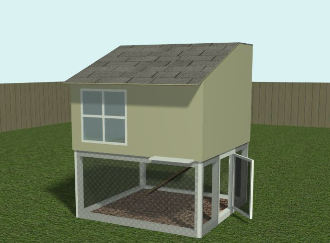Raising hens as domesticated fowl has been with us for over 10,000 years. However, I don’t think you’ll find any mention of them in the Old Testament where most people think the saying “cleanliness is next to Godliness” comes from. Our chicken is one of the most common domestic animals, and for the obvious reasons: some folks like to eat them while others like the eggs. However, even in ancient times there was extra attention given to keeping the flock clean.
Your hens like to scratch at the ground to find seeds, insects and even larger animals such as lizards or young mice to eat. Because of this, they are susceptible to various diseases. When planning your chicken house, make sure the area you assign for this activity is free from any bugs, pests or insects that may harm your hens. Many breeds of hens will live as long as five years and some up to eleven years old if you keep them clean and healthy! (I think the Guinness record was a 16-year hold hen.)
Now if you’re like our family, we cherish our chickens as family pets and use them as a source for fresh eggs. If you have the right laying breed, it can produce as many as 300 eggs a year. Obviously, egg production decreases after each year, but keeping them clean and healthy is a key to full egg production.
Another thing to consider in your chicken house plans is the “social” atmosphere of raising hens. Chickens are a communal-type bird, and they generally live together in flocks. They have a communal approach to the incubation of eggs and raising of young chickens. Individual hens within a flock atmosphere will try to dominate the other hens, thus she establishes the “pecking order.” The dominant hens will be first in line when it comes time to feeding and nesting.
When there is cause to remove a hen or rooster from your flock, this disrupts the pecking order until a new order is established. You have to be careful with young hens added to an existing flock because this pecking order behavior can cause a sort of chicken rivalry, and young chickens can be injured.
Keeping the nesting area clean is a must. Collecting your eggs frequently and regularly will be a start in the right direction. Your hens will actually try to lay eggs in a nest that already has an egg or more already within the nesting box. Hens will even go so far as to move eggs around, taking eggs from one nesting box and moving them into the nesting box where they laid their own eggs.
Frequent collection will prevent some of the issues in this area, and some folks who raise hens will carefully place some placebo or fake eggs (like plastic eggs or even a golf ball) to entice their hens to lay eggs in a particular nesting box.
Once in a while a hen will not want to leave her nesting house so you can clean it. If this is the case, you can try to use something to shoo the hen out, but be careful she does not trample on any of the young chickens. The other thing you can do is wait until the hen leaves to defecate or eat; then close off the nesting area while you clean it.
As mentioned earlier, a clean hen house is necessary to keep away pests. If you have chickens, it is very necessary to for you to clean your chicken house regularly to minimize Red Mites. You will know if your chickens are infested with red mites because egg production will drop and the chickens will peck at each other in an attempt to get the mites. Keep a close watch for this type of pecking, or watch your chickens for any bald patches or bloody patches.
Clean for Red Mites
The red or “chicken mites” can live from as few as 5 days up to 2 weeks. This short cycle allows for fast growth and heavy infestations. They can live in the chicken house just as well as on the chickens themselves. That’s why you must clean your chicken house and treat your chickens as well.
Keeping your chicken house and chickens clean is the best treatment, which is preventing the mites in the first place. If you do get an infestation, there are a number of insecticides available to minimize and eliminate external parasites. One very effective pest controls is “permethrin.” Permethrin does have a long residual time in which it is effective, and that makes it a primary insecticide for treating your chicken house, surrounding areas like the chicken run and even your equipment. You can even apply a smaller concentrated version of permethrin directly on the hens or roosters.
Some other cures you may use to treat mites or even lice would be the use of wood ashes and diatomaceous earth (or DE). This is considered a non-chemical treatment that smothers the mites. There are newer products, such as Poultry Protector, which are a natural enzyme treatment.
The cleaning of your chicken house can be made tremendously easier if it is built right into your chicken house plans. For example, having a hinged door over the nesting boxes allows for quick collection of eggs, but it also allows for quick and easy cleaning of the nesting box area. Likewise, a well designed chicken house will have easy access areas to clean the coop flooring, the perches, the ramp and any chicken run or play area.
Cleaning your chicken house does not have to be a difficult chore, and in fact, it can be a quick, easy time that can involve the entire family. Children love to play with the chickens while the hen house is being cleaned, and with the best chicken house plans, you’ll have the chicken house clean with minimum effort. Cleanliness may be next to Godliness, but when it comes to your chicken house, it just means happy, healthy chickens and a good production of fresh eggs.
By: Syd Hoover
Syd is a chicken enthusiast, who with his family, raises chickens in an urban environment for family pleasure and fresh eggs. If you are interested, you can get more information here on building chicken coops. You can get more information on chicken house designs that are easy to build and easy to clean at http://www.Chicken-House–Plans.com.
More Hen House Articles



Leave a Reply